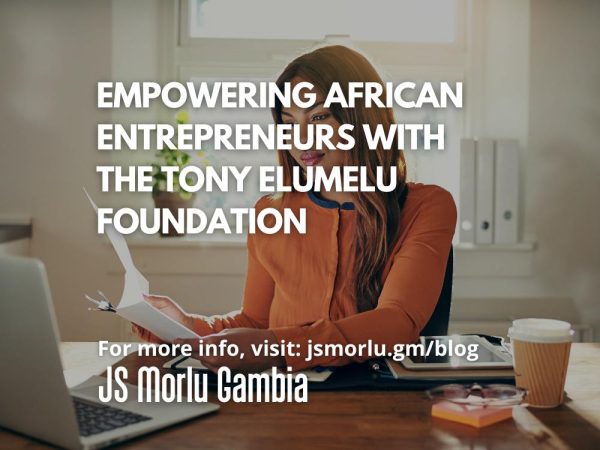Somachi Chris-Asoluka, the newly appointed CEO of the Tony Elumelu Foundation, recently spoke with Business Insider Africa at the GITEX Africa inaugural event. With a decade-long dedication to transforming Africa through entrepreneurship, the Tony Elumelu Foundation has chosen Chris-Asoluka to lead its impactful vision. Despite her young age, Chris-Asoluka’s rapid career ascent and drive indicate that she is poised for even greater achievements.
In this exclusive interview, she shares her insights on the unique characteristics of African entrepreneurs, the exponential growth of the foundation’s applicant pool, the selection process for entrepreneurs, and her ambitious goals as CEO. As the driving force behind the foundation’s strategic initiatives, Chris-Asoluka’s passion and expertise are set to propel the Tony Elumelu Foundation to new heights in its mission to empower entrepreneurs and transform Africa’s economic landscape.
BI Africa: Can you please introduce yourself and share your current role?
Somachi: My name is Somachi Chris-Asoluka, and I am the Chief Executive Officer of the Tony Elumelu Foundation.
BI Africa: When did you assume the position of CEO of the Tony Elumelu Foundation?
Somachi: I was appointed as the CEO in March 2023.
BI Africa: As the new CEO of the Tony Elumelu Foundation, what do you hope to achieve?
Somachi: I joined the foundation in 2014, initially working in the research unit. Over time, I have witnessed the foundation’s growth and impact from various perspectives. From the inception of our scholarship program to the present day, these experiences have humbled me and reinforced my belief in the potential for further achievements.
My dream for the foundation is to significantly increase the number of entrepreneurs we can support in the coming years. I aim to fund at least 100,000 entrepreneurs across Africa within the next 3-5 years, which is an ambitious target. To accomplish this, my team and I are launching the Coalition for African Entrepreneurs initiative. This initiative aims to unite regional, local, and global partners, pooling resources and collaborating with the TEF platform to identify entrepreneurs deserving of funding. Funding 100,000 entrepreneurs in 3-5 years is my goal.
BI Africa: What would you say sets African entrepreneurs apart, particularly in their drive for success?
Somachi: I’ll address this question with a quote from our founder, Mr. Elumelu. He often says that if millions of African entrepreneurs were in California, we would have many more Steve Jobs. This means that African entrepreneurs, who currently operate and sustain their businesses in Africa, have the potential to quadruple their profits if they were situated elsewhere in the world.
African entrepreneurs exhibit remarkable resilience and innovation despite facing adversity. This grit and resilience are common and true characteristics of African entrepreneurs, which are not as prevalent outside of Africa. Additionally, African entrepreneurs possess a unique ability to perceive opportunities where others see doom. They approach challenges with optimism and hope, even in the face of despair.
Moreover, based on our research, African entrepreneurs are more inclined to prioritise community, giving back, and making a positive difference. Many of us come from communal families, including extended families, and this mindset carries over into our business endeavours. For African entrepreneurs, business is not solely about personal profit and wealth accumulation, but also about uplifting others and combating poverty. They rise with the intention of bringing others along on the journey. These characteristics define the typical African entrepreneur and are less commonly found outside Africa.
BI Africa: You mentioned that the most recent batch of the Tony Elumelu Foundation received over 400,000 applicants. Has this figure experienced an exponential increase since the foundation’s launch in 2015?
Somachi: When we launched in 2015, we had a $100 million commitment to support 1,000 entrepreneurs annually. Initially, we anticipated receiving at most 2,000 applications. We believed that every applicant would receive funding from us. However, within that first year, we received 20,000 applications. Fast forward to 2023, we received 400,000 applications.
BI Africa: Could you elaborate on the selection process for African entrepreneurs and what criteria you consider during the evaluation?
Somachi: Choosing the entrepreneurs is one of the most challenging aspects of our work. We seek individuals who possess a deep understanding of their market. We are not looking for entrepreneurs who merely replicate existing business models; we are interested in those who have conducted thorough market research, identified their value proposition, and can eloquently articulate it.
Furthermore, we prioritise entrepreneurs who align with the Sustainable Development Goals (SDGs). Africa still has a long way to go in achieving these SDGs, so we actively seek entrepreneurs who have identified how their businesses can address specific SDGs out of the seventeen(17) established. They need to demonstrate a clear plan for utilising their business to make progress towards these goals.
Lastly, we seek entrepreneurs who are committed to long-term, sustainable business practices. We want their ventures to remain viable even fifteen years from now, and they must provide evidence of such sustainability.
BI Africa: Reflecting on your career leading up to becoming CEO, what would you say has been the key to your success?
Somachi: I attribute my success to hard work. There is no substitute or shortcut to success; it requires dedication and effort. Throughout my career journey, I have learned that putting in the work, making sacrifices, and maintaining discipline is crucial. Having a long-term mindset and being a dependable team player is also essential. Since 2014, I have been with the foundation, taking on various roles within the organisation before reaching my current position. Therefore, I believe that my hard work, dependability, and consistency have been instrumental in my journey to where I am today.
Original Source: Business Insider Africa
